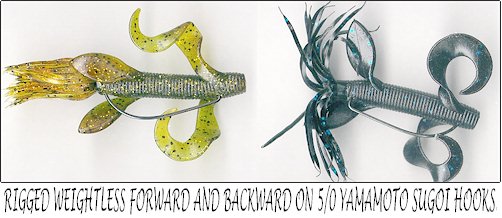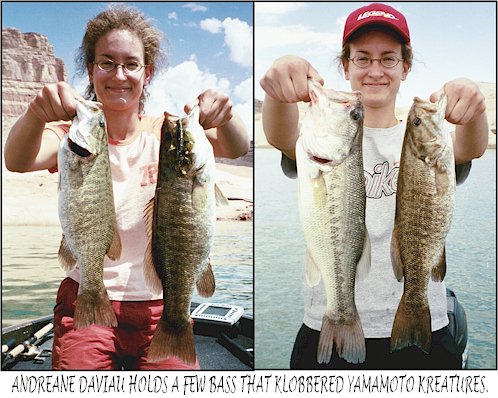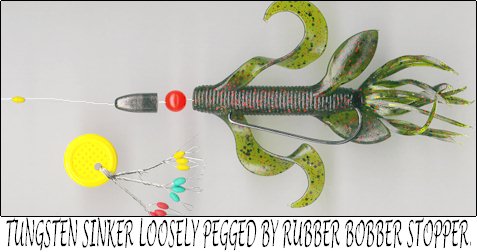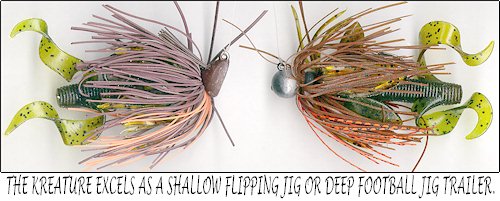Using the Yamamoto Kreature
As a new lure, new ways to use the Kreature are sure to be
discovered. The four-inch Kreature weigh a hefty 7/16 oz without
any hook or sinker. It has all the necessary equipment - arm,
paddle and skirt action in a compact, heavy package. Bulky for
its size, much of the mass is in the multiple appendages. The
torso where the hook hides is not excessively thick - so you can
get a quick, solid hookset. If bass don't gulp the Yamamoto
Kreature out of hunger, they'll surely crush it as something out
of the ordinary. It's the ultimate odd critter in the underwater
food chain.
A Classic Dropbait
Western pro tournament dominator Gary Dobyns says what has
been missing from the Yamamoto product line is some kind of bulky
flip bait. Although I flip Senkos and Fat Ikas 80-90% of the
time, I would still love to have a bulkier flipbait by Yamamoto,
says Dobyns. Now it's here! The Kreature is designed to use as a
classic dropbait to flip in bassy cover. Rig it either forward or
backward to flip. It's heavy enough to sink with or without a
sinker. Simply flip or pitch it, let 'er sink, flap it around and
flip it again.

New Pegging Method
It can be tough to peg today's tungsten sinkers. Many tungsten
sinkers come with tubing inserts inside to protect the line from
rubbing and fraying against the tungsten. To try to peg a
tungsten sinker with a toothpick can knock the tubing loose
inside. Fortunately, rubber bobber stoppers are a new pegging
alternative that works well to help peg tungsten (lead, etc.)
sinkers in place. Resembling a colorful grain of rice, bobber
stoppers come on a keychain type threader. Thread a bobber
stopper on the line, then lace a sinker on the line before
knotting a hook to the end. You know have an adjustable pegged
sinker rig. The rubber grain won't stay perfectly in place all
day. The rubber grain may get knocked up the line as you wrestle
your Kreature in and out of snags. When required, two rubber
grains can be used to better hold a heavy sinker in place.

Unpegged Illusion
Intentionally positioning the rubber grain from a few inches
to a foot up the line produces a desirable life-like illusion.
The sinker becomes a second lure. The rig mimics a bulky critter
(the Kreature) in hot pursuit of a bitty critter (the sinker) -
and nipping its heels every time the Kreature bangs up against
the sinker. The sinker constantly slips a few inches or a foot
away, bumps the bobber stopper, seemingly evading its pursuer. As
you shake or pull the line, the Kreature catches its prey again
and nips the sinker again. This resemblance of a critter feeding
in front of a bass can trigger its competitive instinct. A bass
will barrel out of cover for no other reason than to dominate and
disrupt the Kreature's foibled feeding opportunity. Additionally
as the dense tungsten sinker slams back into the bulky Kreature
body each time the contact causes an abrupt change in the
Kreature's demeanor - a thud, a shock you can feel in the line,
causing the tails to pulse, the paddles to flare open and closed
each time the sinker slams it and the Kreature "bites"
the sinker. It's an intense moment to trigger a strike.

An Unconventional Swimbait
Long, limber swimming arms that never stop sculling are the
Kreature's main feature when the Kreature is in motion. The arms
swim constantly. In more open water areas, the Kreature can be
used like a casting swimbait rather than a flipping dropbait.
Swim it weightless a foot or two under the surface for smashing
strikes from suspended bass.
Also swim it a foot or two above bottom. With it's slow
weightless descent, count it down, then swim it slowly above
bottom through the tops of underwater weed beds or brush piles.
Deadsticked on Bottom
The two short side paddles spring into action when the
Kreature settles to rest on bottom, flopping open and closed at
the slightest movement. When deadsticked on bottom, the more
buoyant plastic formulation of the welded-on skirt takes over
too. Even when the Kreature is perfectly motionless, the
twenty-four tentacles still quiver nervously to compel any
watching bass to strike.
Skimming the Surface
The Kreature will waddle and gurgle across the surface,
attracting explosive strikes. To begin, get the right rod angle
with the tip high to get the Kreature on plane on top. Once
there, the flat wide legs serve as side stabilizers to eliminate
roll and get surface-gripping traction to keep the Kreature
fairly stable as it purrs and gurgles, creating a bubbly
boisterous vee wake like a buzzbait.
A second topwater tactic, a little harder to do, is bulging
beneath but not breaking the surface. Bulging is a bit harder to
master since the Kreature doesn't get support and stability from
being propped up on its side legs raised half out of the water.
The objective for bulging is to keep the Kreature barely under
the surface, without rolling, while it leaves a bulging, rippling
wake. A bit more eye/hand/rod coordination is necessary to
perfect this presentation.
On a Jig
With skirt-to-back on a jig, I tend to experience a lot of leg
wrap where the side legs get fouled on the hook bend or barb. Leg
wrap can be avoided by putting the Kreature on a jig
skirt-to-front. This tends to eliminate most of the leg wrap.
With the skirt fronds and flappers under the jig skirt, it adds a
lot of bulk. The twin tails and stumpy torso at back mimic a
crawfish head and pincers.

Rockhopper, Mojo or Carolina Rig
Another tactic is to rig the Kreature about a foot behind a
Rockhopper, Mojo or Carolina sinker. As you skitter, pull and
pause the rig across the bottom in a stop-n-go fashion, the
sinker appears to be a small food item being stalked by another
critter, actually your Kreature. It's a deadly game of
cat-and-mouse, one that can infuriate a nearby bass to belt the
Kreature sharply. You get some nasty reaction bites doing this.
Bass just don't tolerate another critter (your Kreature) feeding
in front of them. Bass will aggressively belt the Kreature that
is attempting to "eat" the sinker. It's Mother Nature's
version of a food fight.
Use a Rockhopper, Mojo or Carolina sinker? Both the Rockhopper
or original Mojo are more snagless than many other Carolina
sinker types. I use the original Mojo sinker to come through
weedy environments. I use the Rockhopper in rocks, brush and
weedless environments. Even in open environments, I tend to use
the Rockhopper. Reason is when reeling it up off bottom, the
Rockhopper tends to sway side-to-side on the line. I equate this
sinker action to what a diving bill does on a crankbait. Although
the bait trailing behind the sinker does not sway, the Rockhopper
itself paddles from side to side. To me, I fancy this generates a
wobbling vibration or cadence of water displacement that bass can
sense emanating from the sinker. So I think the Rockhopper's
paddling on the line has some attractive properties, thus the
reason I use it even over smooth open bottom.
I rig either the Rockhopper or the original Mojo the same as
the venerable Carolina rig. I lace the sinker loose on the main
line, followed by a bead, a swivel, a length of leader line and
hook. To me, there are no finer than SPRO Power Swivels. They are
strong swivels despite their tiny appearance. A standard rigging
size of SPRO Power Swivel is incredibly 130 lb. test.
I tend to rig religiously with a bead because:
- It makes small clicking noises when the sinker strikes the
bead, and
- bait-sized small-fries are always pecking at the bead like
barnyard hens on a June bug.
These small bead peckers attract larger predators like bass
over to the scene. As the bead peckers scurry to exit stage
right, your Kreature is the last man left standing on the dance
floor to attract the interest or ire of a larger fish.
I favor plastic beads, which have less chance than glass to
chip and cut the line. Some say glass makes a louder click than
plastic. I find the plastic clicks more than loud enough for me
and my bass, and plastic has more vibrant colors. There are also
plastic hollow beads with sand or buckshot in them. I like the
sound of that too. I can't swear it helps, but I do swear it
doesn't hamper the fish-attracting confidence such beads can give
me.
The Well-Anointed Kreature
Speaking of confidence, I have it in MegaStrike attractant. I
don't put MegaStrike on individual baits. I squeeze a big glop
into an entire bag of Kreatures, then smush it around to cover
them all. This way, I put MegaStrike on once per bag, not each
and every time I put on a new bait. If I fish with a Kreature
long enough that I lose confidence, I will re-apply MegaStrike to
the bait and to the entire rig - hook, line, swivel, bead,
sinker.
The Hawaii Rig
Who knows why rigging methods are named after states? Texas,
Carolina, Florida. It is a fine American bass fishing tradition.
So I have dubbed what I do with a heavy tackle dropshot rigging
as the Hawaii rig since the original components I deployed
both have Hawaiian-sounding names:
- a hula grub, until now has been the only lure I've
used on a heavy tackle dropshot or Hawaii rig. Reason is line
twist, the bane of dropshotting, will twist the line into nasty
knotted coils with any other bait type I've tried except for the
hula grub. Now, the Kreature is another relatively twistless lure
to use on a Hawaii rig.
- a pineapple sinker, made by Mojo. It is an elongated
cylindrical snagless dropshot sinker shape that slips through
snags that would eat most other sinker shapes. On its crown, the
pineapple sinker sprouts a grooved swivel that clips on the line
without a knot. I also use the Mojo Drop Shot Dream sinker, which
is the same shape, except in sizes up to a full ounce. The line
clip is an internal wire that pulls inside the Drop Shot Dream
sinker.
The rod and line I favor for the Hawaii rig are stout. A
medium/heavy or heavy action stick and 16 lb gray Sugoi
fluorocarbon line. It's more the strength of a Carolina rigging
rod. It is not your typical light line dropshot set-up. I use a
4/0 offset shank hook tied dropshot style to Texas-rig the
Kreature a foot or two above the dropshot sinker.
Light Line Dropshot Rig
Most other ways you rig (weightless, Carolina, Texas, a jig),
there is only one direction of pull - from ahead of the Kreature.
The dropshot is the only rig that pulls the Kreature from two
directions - ahead (rod, reel, line) and behind (sinker below).
This seesaw effect generates more flexure in the tentacles, more
"start and stop" action in the paddles and swimming
legs than most other ways to rig the Kreature.
As big and bulky as it is, the Kreature excels on light six
pound test dropshot spinning rods. Relatively twistless when
rigged carefully straight, I simply impale a Kreature about four
rib-rings back, in the chin and out the top with a 1/0 Gamakatsu
Splitshot/Dropshot hook. When away from line-popping cover, this
light-line approach to using a big bulky "flipbait" has
been as or more effective as any other way I've tried using the
Kreature.
These are some of the ways the Kreature has been deadly for me
and can be for you. As a new lure, exciting new ways to use the
Kreature are sure to be discovered.
| 